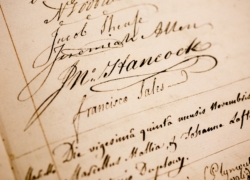Climbing the family tree: Archdiocesan archives a valuable tool for researchers
Most people have a desire to discover their origins and to know from whence they came. And for many people, tracing family genealogy can be an interesting and rewarding experience; but it can also be a daunting task. Head archdiocesan archivist Robert Johnson-Lally, who oversees thousands of Church records, has helped countless visitors trace their ancestry through the Archdiocese of Boston’s birth, marriage and death records. Johnson-Lally shares his tips with The Pilot for conducting genealogic research using Church documents.
The Pilot: What do you think draws people to study their genealogy?
Johnson-Lally: People want to know where they are from both geographically and what their heritage is, points of origin, etc. They are intrigued by learning of the past, of their ancestors: who they were, where they came from, their lives in general. It imparts a sense of continuity in their own lives.?
Q. What can a family member learn about his or her history from this type of research?
A. From baptism records one can discover birth dates, names of parents including mother’s maiden name, which can provide clues to other relatives and names of witnesses such as godparents, which can also be helpful in expanding the range of one’s research. Some records indicate a point of origin or birthplace. This is not always so, however, and often a source of disappointment to genealogists. Researchers can find subsequent sacraments, which should be noted in a person’s baptismal record. From a marriage record, the researcher can sometimes discover, besides the obvious, names of parents, occupation, age at marriage and witnesses.?Not every record has all this information, but in conducting this type of research one should try to get as complete a picture as possible by using a variety of sources. Not every researcher will be successful, but the research itself is part of the satisfaction.
Q. What makes genealogical research so interesting?
A. Genealogists, or those who research their genealogy, open up a new world to themselves. They find things about themselves and their forbears that they never suspected. Sometimes this comes as a shock; at other times it is very satisfying. But it is never dull.
Q. How reliable is it?
A. That depends on the sources. Word of mouth or family recollection can be close, but off just enough to confuse the issue. Local, state and federal records are generally pretty accurate as are church records. This is not to say that they never err, but, on the whole, they can usually be trusted. The problem arises when the records do not agree. Often in these cases, names are transposed incorrectly from one set of records to another or dates may conflict. At that point more research becomes necessary.
Q. How often do people visit the Archdiocesan Archives to conduct this type of research?
A. Up until last year, when we moved, Archives received over 1,000 requests annually for genealogy related research. Some of these consisted of mail requests, but many were in-person research visits.
Q. How should one start his or her genealogic research? What should they do to prepare?
A. I always suggest that people start by trying to find civil records: births, marriages, deaths, etc. Then they can look for church records. In some cases where no civil records exist, church records can fill in the gaps in research. If possible, researchers should know names, approximate dates, locations, and any other clues that would aid in locating the records.
Q. What are some of the tips that you give them?
A. I suggest that they have some idea of what parish is involved before they begin. Our records are arranged by parish and we have no central index of names. For example, to say that their subject was born in Boston between 1880-1910 is not very helpful. Having an approximate date and a location, such as Roxbury, Dorchester or Lowell, will narrow the search considerably. Sometimes researchers need to combine civil and church records to get a complete picture of their subjects.
Q. What types of documents contained in the Archives are helpful for this type of family research?
A. Records in the Archives that are most helpful to genealogists are the sacramental records, mostly baptisms and marriages. Other records such as directories and parish histories may help in pointing the way, but it is the sacramental records that yield the most for their research.
Q. What documents are most helpful in uncovering one’s genealogy?
A. Outside of church records, civil records such as birth certificates, marriage licenses and death records are of vital importance. In addition, city directories can often pinpoint a location where an ancestor may have been living at a particular time.
The Archdiocesan Archives will re-open to the public on Jan. 6, 2009. Research hours are 10 a.m. to 4 p.m. on Tuesdays, Wednesdays and Thursdays. Space is limited so appointments are required. Prospective researchers are welcome to write to the Archdiocesan Archives. Written requests may be sent to Robert Johnson-Lally, Archdiocese of Boston, 66 Brooks Dr., Braintree, MA 02184. ?For more information or to make an appointment, call 617-746-5795. ?



















